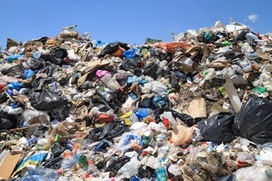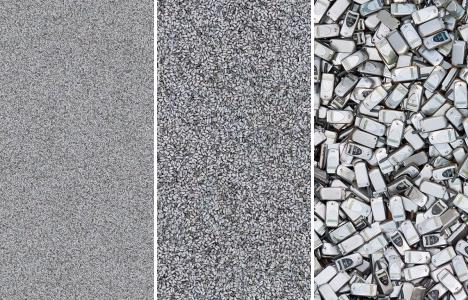Waste
|
Navigation
"You must teach your children that the ground beneath their feet is the ashes of your grandfathers. So that they will respect the land, tell your children that the earth is rich with the lives of our kin. Teach your children what we have taught our children, that the earth is our mother. Whatever befalls the earth befalls the sons of the earth. If men spit upon the ground, they spit upon themselves." ~Native American Wisdom Depicts 426,000 cell phones, equal to the number of cell phones retired in the US every day. Courtesy of Chris Jordan | Click to enlarge
|

Waste, also known as rubbish, trash, refuse, garbage, junk, and litter, is unwanted or useless materials. There are many types of waste, including municipal, hazardous, electronic, bio-medical, radioactive, industrial and more. In the US, we generate more waste than any other country in the world, recycle far less than other developed nations, and waste half of our food, which costs us $164 billion annually, more than half of our energy through inefficiency, three-quarters of our fuel in gas guzzlers, 95% of water in our homes, at least 11.4 billion dollars in recyclables and so forth. Waste can contaminate virtually anything, including soil, air, surface and ground water, which can lead to serious problems for humans, other species and ecosystems. Waste treatment and disposal produces significant greenhouse gas emissions, including carbon dioxide and methane, which are contributing significantly to global climate change and attracts rodents and insects which harbor gastrointestinal parasites, yellow fever, worms, the plague and other conditions for humans. Exposure to hazardous wastes, particularly when they are incinerated, can cause various other diseases including cancers. The need for expansion and siting of waste treatment and disposal facilities is increasing worldwide with a growing market in the transboundary movement of significant amounts of waste from developed to developing nations. Learn more.
via chartsbin.com |
Landfills
Solid waste landfills play an important role in modern-day society and are indispensable for handling humanity's unprecedented rates of consumption, however, the adverse health and environmental effects of ever-growing landfills pose serious risks that are essential to understand so we may further acknowledge the importance of holding onto our items and reusing them as long as we can, composting, recycling etc.
E-Waste
Electronic waste, also known as e-waste, is the discarding of electrical or electronic devices, such as computers, office electronic equipment, entertainment device electronics, mobile phones, television sets, refrigerators etc. E-waste is a global problem, especially with the transboundary movement of e-waste where developed countries ship their discarded electronic equipment to less developed countries.
Incineration
Incineration of both hazardous and harmless wastes may cause emissions of substances which pollute the air, water and soil and have harmful effects on the surrounding environment and human health.
Litter
Research shows about 85% of littering is the result of individual attitudes. Changing individual behavior is key to preventing litter. Once litter is on the ground, it attracts more litter and will eventually become ocean litter since the ocean is downhill to everything. On the flip side, a cleaner community with more readily available trash and recycling receptacles actually discourages littering and improves community appearance and quality of life.
|
Last Revised: 11/20/13
Commenting Rules |






